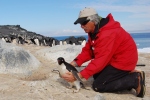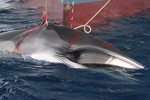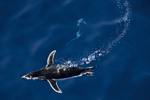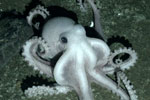As the most pristine marine ecosystem on the planet, Antarctica’s Ross Sea has become dubbed the world’s “last ocean.” Home to an abundance of penguins, whales, orcas, seals, and massive fish, the Ross Sea has so far largely avoided the degradation that has impacted much of the world’s other marine waters. However, a landmark proposal to protect the Ross Sea, as well as the coastline of East Antarctica, has failed today due to opposition by Russia.
“After two years of preparation, including this meeting, which Russia requested to settle the scientific case for the Ross Sea and East Antarctic proposals, we leave with nothing,” said Steve Campbell, Director of the Antarctic Ocean Alliance.
Given its ecological importance, the U.S. and New Zealand proposed setting aside 2.3 million square kilometers of the Ross Sea for protection. The proposal has been supported by a widespread groups of NGOs, scientists, and nations, and, if established, the reserve would be the largest marine protected area in the world. However, in a meeting today of the Commission for the Conservation of Antarctic Marine Living Resources (CCAMLR) in Germany, Russia noted it would not sign on to the protected area and further claimed that the CCAMLR had no legal rights to set up protected areas—even though the organization (which includes 24 nations) has already established a protected area. Decisions made by CCAMLR must be unanimous.
 Orca mother and calf surfacing in the Ross Sea. Photo by: Robert Pitman. |
Australia, France and the EU also proposed to set up seven protected areas along the coastline of East Antarctica, which would protect 1.9 million square kilometers in total. This proposal is also on hold due to opposition from Russia.
Although long remote and little-impacted, the world’s southern oceans have come under increasing exploitation in recent decades. As the world’s more northernly oceans have become overfished, the fishing industry is now turning to the Southern Ocean for krill and Antarctic toothfish (Dissostichus mawsoni), known to consumers as the expensive Chilean seabass. Little is known about the Antarctic toothfish, but given that it’s a slow-growing predator it could be depleted quickly. Krill, which underpins the entire ecosystem, is caught for Omega-3 products. Climate change and ocean acidification are also expected to increasingly impact the ecosystem.
The sanctuaries would not have banned fishing altogether, but instead set new regulations and no-go zones. Russia is among a few nations that have fishing fleets in the region.
In fact, David Ainley, a marine biologist who has spent decades in the Ross Sea, says that the protection process has already been undercut by the global fishing industry. Initially scientists pushed for protection of Ross Seas shelf and slope from fishing, including a ban on fishing, but Ainley says this was soon left to the wayside.
“The great powers (NZ, USA), and the NGOs, didn’t see the where-with-all to protect this area, because doing so would curtail fishing for toothfish. So, instead they added 1.7 million square kilometers of abyssal ocean to the north of the western shelf and waved flags about how this would protect undefined ‘biodiversity’ producing the largest MPA in the world. The P in MPA is incredibly challenged. They should call it Marine Managed Area, but, then, that is what CCAMLR is supposed to be doing: managing.”
According to Ainley this has become apart of a broader pattern to protect the fishing industry.
“The ‘MPAs’ that have been established around, e.g. South Georgia
(UK) and Heard Island (Australia) don’t prohibit fishing either, and the
boundaries of the MPA south of the South Ornkneys were devised by the
fishing industry. So, there’s a lot of double-speak going on in this
Southern Ocean MPA initiative.”
Still many NGOs are hoping for future progress on the U.S. and New Zealand proposal. Despite Russia’s intransigence, nations say there is still another chance to establish the sanctuaries in late October when CCAMLR meets again. But Russia will have to be convinced in the meantime.
Related articles
In the midst of marine collapse will we save our last ocean?

(07/05/2010) Imagine an ocean untouched by oil spills: a sea free of pollution, invasive species, dead zones, and over-exploitation; waters where marine animals exist in natural abundance and play ecological roles undimmed by mankind. Such a place may sound impossible in today’s largely depleted oceans, but it exists: only discovered in 1841, the Ross Sea spreads over nearly a million kilometers adjacent to the Antarctic continent. Here killer whales, penguins, sea birds, whales, and giant fish all thrive. However, even with its status as the world’s ‘last ocean’, the Ross Sea has not escaped human impact. Over the last 15 years commercial fisheries have begun to catch one of its most important species in the ecosystem to serve them up on the dinner plates of the wealthy.
Australia aims to end Japan’s whaling

(06/27/2013) Australia is hoping to put a permanent end to Japan’s annual slaughter of hundreds of whales in the Southern Ocean, in a landmark legal challenge that begins this week. Australia, a vocal opponent of Japan’s annual “scientific” hunts in the Antarctic, says it is confident that the international court of justice (ICJ) in The Hague will outlaw the hunts at the end of a highly anticipated case that is due to start on Wednesday.
Animals dissolving due to carbon emissions

(12/03/2012) Marine snails, also known as sea butterflies, are dissolving in the Southern Seas due to anthropogenic carbon emissions, according to a new study in Nature GeoScience. Scientists have discovered that the snail’s shells are being corroded away as pH levels in the ocean drop due to carbon emissions, a phenomenon known as ocean acidification. The snails in question, Limacina helicina antarctica, play a vital role in the food chain, as prey for plankton, fish, birds, and even whales.
Penguins face a slippery future

(09/26/2012) Penguins have spent years fooling us. With their image seemingly every where we turn—entertaining us in animated films, awing us in documentaries, and winking at us in commercials—they have made most of us believe they are doing just fine; the penguin’s charming demeanor has lulled us into complacency about their fate. But penguin populations are facing historic declines even as their popularity in human society rises. Overfishing is decimating some of their prey species, climate change is shifting their resources and imperiling their habitat, meanwhile pollution, such as oil spills, are putting even healthy colonies at risk. Now, a young organization, the Global Penguin Society (GPS), is working to save all of the world’s 18 penguin species by working with scientists, governments, and local communities.
Three U.S. retailers pledge to avoid fish from embattled Ross Sea
(03/14/2012) The Ross Sea, a massive bay off Antarctica, has been dubbed the world’s last ocean due to its pristine state, long-untouched by industry and fisheries. However, over the last 15 years New Zealand commercial fisheries have entered the sea, seeking the slow-growing Antarctic toothfish which is usually sold as the high-end Chilean sea bass. Now as conservation groups plead for nations to grant the Ross Sea protected status, Greenpeace has begun a campaign to get good retailers to steer clear of stocking Antarctic toothfish. To date, Safeway, Wegmans, and Harris Teeter has all pledged not to source from the Ross Sea.
‘Lost world’ dominated by Yeti crabs discovered in the Antarctic deep

(01/03/2012) Scientists have discovered a deep sea ecosystem dominated by hairy pale crabs off of Antarctica. The new species of “Yeti crabs” survive alongside many other likely new species, including a seven-armed meat-eating starfish, off of hydrothermal vents, which spew heat and chemicals into the lightless, frigid waters. According to the paper published in PLoS ONE, this is the first discovery of a hydrothermal vent ecosystem in the Southern Ocean though many others have been recorded in warmer waters worldwide.
(01/05/2011) In November of 2010, the Antarctic toothfish fishery was deemed sustainable by the Marine Stewardship Council. This certification goes against the advice of many marine scientists who claim that insufficient research has been done to determine the full impact of commercial fishing on this enigmatic species.
Ocean prognosis: mass extinction

(06/20/2011) Multiple and converging human impacts on the world’s oceans are putting marine species at risk of a mass extinction not seen for millions of years, according to a panel of oceanic experts. The bleak assessment finds that the world’s oceans are in a significantly worse state than has been widely recognized, although past reports of this nature have hardly been uplifting. The panel, organized by the International Program on the State of the Ocean (IPSO), found that overfishing, pollution, and climate change are synergistically pummeling oceanic ecosystems in ways not seen during human history. Still, the scientists believe that there is time to turn things around if society recognizes the need to change.
Antarctic penguins losing to climate change through 80% krill decline
(04/11/2011) Climate change has hit species of Antarctic penguins by causing a staggering decline in their prey: krill. A new study in the Proceedings of the National Academy of Sciences (PNAS) has found that both chinstrap penguins (Pygoscelis antarcticus) and Adélie penguins (Pygoscelis adeliae) have seen their populations decline likely do to less krill, instead of habitat changes. Since 1970 krill populations have fallen by 80% in the Southern Ocean surrounding Antarctica. Because krill require sea ice to reproduce, shrinking sea ice from climate change has made it more difficult for them to breed.














